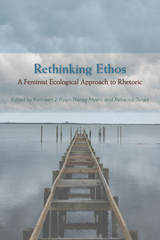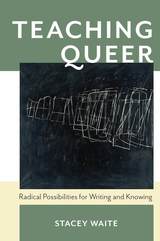4 books by Waite, Stacey

Butch Geography
Stacey Waite
Tupelo Press, 2013
In her Los Angeles Review of Books essay “Who Is Who: Pronouns, Gender, and Merging Selves,” Dana Levin describes Stacey Waite’s fusion of gender identities: “Pseudonyms, heteronyms, personae, all the ventriloquizing literary arts; point of view and tonal shifts: these are tools for speakers and speaking. But the sentence too has a voice: ‘i will not be the kind of boy who can not bear the memory of her body’ … This is [Waite’s] genius … to take innocuous syntactical phrasing and change the players mid-sentence — to get around English’s pronominal either/or by creating a syntactical both/and…”
[more]

The lake has no saint
Stacey Waite
Tupelo Press, 2010
Stacey Waite’s the lake has no saint is a study in grief — a work of poetic archaeology that traces the artifacts of the past into the relationships of the present.
Embedded in a powerfully modulated sequence addressing a “you” who shifts in location and identity, many of these poems feel like forms of request, imploring. The speaker’s androgynous self-awareness — and wary attention to the gendered assumptions elicited by bodies — disclose in each poem a recognizable but disorienting (and pressurized) situation.
the lake has no saint will unsettle a reader’s sense of the certainty and stability of gender, as grammar and phrasing are also disrupted and blurred, often requiring us to read closely to hear where one sentence ends as another begins. Yet despite its formal and thematic iconoclasm, this is a book that clearly elucidates a story both heart-rending and ultimately — in its vatic honesty — triumphant.
Embedded in a powerfully modulated sequence addressing a “you” who shifts in location and identity, many of these poems feel like forms of request, imploring. The speaker’s androgynous self-awareness — and wary attention to the gendered assumptions elicited by bodies — disclose in each poem a recognizable but disorienting (and pressurized) situation.
the lake has no saint will unsettle a reader’s sense of the certainty and stability of gender, as grammar and phrasing are also disrupted and blurred, often requiring us to read closely to hear where one sentence ends as another begins. Yet despite its formal and thematic iconoclasm, this is a book that clearly elucidates a story both heart-rending and ultimately — in its vatic honesty — triumphant.
[more]

Rethinking Ethos
A Feminist Ecological Approach to Rhetoric
Edited by Kathleen J. Ryan, Nancy Myers, and Rebecca Jones
Southern Illinois University Press, 2016
Labels traditionally ascribed to women—mother, angel of the house, whore, or bitch—suggest character traits that do not encompass the complexities of women’s identities or empower women’s public speaking. Rethinking Ethos: A Feminist Ecological Approach to Rhetoric redefines the concept of ethos—classically thought of as character or credibility—as ecological and feminist, negotiated and renegotiated, and implicated in shifting power dynamics. Building on previous feminist and rhetorical scholarship, this essay collection presents a sustained discussion of the unique methods by which women’s ethos is constructed and transformed.
Editors Kathleen J. Ryan, Nancy Myers, and Rebecca Jones identify three rhetorical maneuvers that characterize ethos in the feminist ecological imaginary: ethe as interruption/interrupting, ethe as advocacy/advocating, and ethe as relation/relating. Each section of the book explores one of these rhetorical maneuvers. An afterword gathers contributors’ thoughts on the collection’s potential impact and influence, possibilities for future scholarship, and the future of feminist rhetorical studies.
With its rich mix of historical examples and contemporary case studies, Rethinking Ethos offers a range of new perspectives, including queer theory, transnational approaches, radical feminism, Chicana feminism, and indigenous points of view, from which to consider a feminist approach to ethos.
Editors Kathleen J. Ryan, Nancy Myers, and Rebecca Jones identify three rhetorical maneuvers that characterize ethos in the feminist ecological imaginary: ethe as interruption/interrupting, ethe as advocacy/advocating, and ethe as relation/relating. Each section of the book explores one of these rhetorical maneuvers. An afterword gathers contributors’ thoughts on the collection’s potential impact and influence, possibilities for future scholarship, and the future of feminist rhetorical studies.
With its rich mix of historical examples and contemporary case studies, Rethinking Ethos offers a range of new perspectives, including queer theory, transnational approaches, radical feminism, Chicana feminism, and indigenous points of view, from which to consider a feminist approach to ethos.
[more]

Teaching Queer
Radical Possibilities for Writing and Knowing
Stacey Waite
University of Pittsburgh Press, 2017
Teaching Queer looks closely at student writing, transcripts of class discussions, and teaching practices in first-year writing courses to articulate queer theories of literacy and writing instruction, while also considering the embodied actuality of being a queer teacher. Rather than positioning queerness as connected only to queer texts or queer teachers/students (as much work on queer pedagogy has done since the 1990s), this book offers writing and teaching as already queer practices, and contends that the overlap between queer theory and composition presents new possibilities for teaching writing. Teaching Queer argues for and enacts “queer forms”—non-normative and category-resistant forms of writing—those that move between the critical and the creative, the theoretical and the practical, and the queer and the often invisible normative functions of classrooms.
[more]
READERS
Browse our collection.
PUBLISHERS
See BiblioVault's publisher services.
STUDENT SERVICES
Files for college accessibility offices.
UChicago Accessibility Resources
home | accessibility | search | about | contact us
BiblioVault ® 2001 - 2024
The University of Chicago Press









